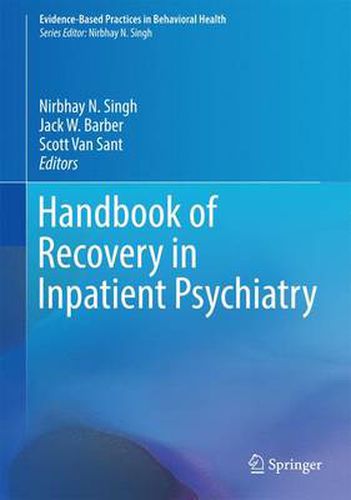Readings Newsletter
Become a Readings Member to make your shopping experience even easier.
Sign in or sign up for free!
You’re not far away from qualifying for FREE standard shipping within Australia
You’ve qualified for FREE standard shipping within Australia
The cart is loading…






This title is printed to order. This book may have been self-published. If so, we cannot guarantee the quality of the content. In the main most books will have gone through the editing process however some may not. We therefore suggest that you be aware of this before ordering this book. If in doubt check either the author or publisher’s details as we are unable to accept any returns unless they are faulty. Please contact us if you have any questions.
This handbook provides a guide for individualized, responsive, and meaningful care to patients with severe mental illness. It begins with an overview of the foundational aspects of recovery - definitions and assessment, recovery principles, recovery research, and applications of recovery principles in in inpatient psychiatry. Subsequent chapters offer in-depth analyses of provider competencies, the patient’s role in personal choices and decision making, and the deeper healing goals of recovery. The handbook also offers detailed treatment modalities, including cognitive remediation, psychological and psychiatric services, nursing and occupational therapy services, peer support, and pharmacological treatment. Featured topics include:
Sexuality and sexual health in the inpatient psychiatric setting.
The power of stigma and the usage of SAMHSA (Substance Abuse and Mental Health Services Administration) principles to combat stigma.
Legal advocacy.
Self-advocacy and empowerment.
Methods to enhance resilience and sustain recovery in inpatients.
Common errors and solutions during the transformation to recovery-oriented systems.
The Handbook of Recovery in Inpatient Psychiatry is a must-have resource for researchers, graduate students, clinicians, and related professionals/practitioners in psychology, psychiatry, social work, nursing, rehabilitation therapy, occupational therapy, physical therapy, and allied professionals in related mental health and medical disciplines.
$9.00 standard shipping within Australia
FREE standard shipping within Australia for orders over $100.00
Express & International shipping calculated at checkout
This title is printed to order. This book may have been self-published. If so, we cannot guarantee the quality of the content. In the main most books will have gone through the editing process however some may not. We therefore suggest that you be aware of this before ordering this book. If in doubt check either the author or publisher’s details as we are unable to accept any returns unless they are faulty. Please contact us if you have any questions.
This handbook provides a guide for individualized, responsive, and meaningful care to patients with severe mental illness. It begins with an overview of the foundational aspects of recovery - definitions and assessment, recovery principles, recovery research, and applications of recovery principles in in inpatient psychiatry. Subsequent chapters offer in-depth analyses of provider competencies, the patient’s role in personal choices and decision making, and the deeper healing goals of recovery. The handbook also offers detailed treatment modalities, including cognitive remediation, psychological and psychiatric services, nursing and occupational therapy services, peer support, and pharmacological treatment. Featured topics include:
Sexuality and sexual health in the inpatient psychiatric setting.
The power of stigma and the usage of SAMHSA (Substance Abuse and Mental Health Services Administration) principles to combat stigma.
Legal advocacy.
Self-advocacy and empowerment.
Methods to enhance resilience and sustain recovery in inpatients.
Common errors and solutions during the transformation to recovery-oriented systems.
The Handbook of Recovery in Inpatient Psychiatry is a must-have resource for researchers, graduate students, clinicians, and related professionals/practitioners in psychology, psychiatry, social work, nursing, rehabilitation therapy, occupational therapy, physical therapy, and allied professionals in related mental health and medical disciplines.